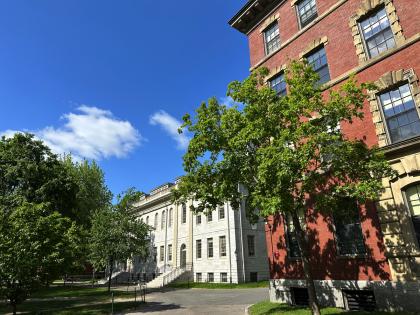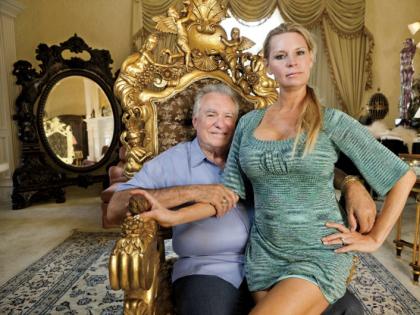Dr. Julio Frenk, former Minister of Health of Mexico and visiting professor. Harvard School of Public Health Commencement Address. Healthcare is a social right, Dr. Frenk asserts. All human lives have the same value, and healthcare systems must provide similar treatment for similar needs, he said. "Since the great majority of health deficits are involuntary, it follows that no type of discrimination in access to health services can be morally valid."
Thank you very much, and good afternoon. It is, indeed, a great honor for me to be able to share this very special moment with all of you -- professors, parents, pupils, the permanent pillars of education. I am especially delighted to be here this time of the year. I have always cherished spring in Boston. The view of those boats sailing across the Charles River embraced by the gentle afternoon light gives meaning to the image of spring as renewal.
This is exactly what brings us together today, the sense of renewal. Like spring itself, the notion of commencement speaks of a beginning, of the fresh feeling that one phase is about to end and another to commence. Life itself is but a succession of transitions. They express the deep processes of change that leap from one stage of existence to another. Today, you are culminating one of those transitions. I am sure that your experience at school feels now as if it was just a blink, and now you are in transit to a new station in your vital journey.
I use the word transit intentionally. It is defined as the passage of one state to another, but also as the act of passing through. Both definitions suit you well. You are leaving behind the student status to become public health professionals, and your diploma is the bridge between these two conditions. But you are also moving from the congenial environment of the university to a changing and demanding world, and you are doing so at a particularly restless moment in the history of public health.
The message I would like to convey to you this beautiful spring afternoon is that you are in transit to a world which is itself in transition. Your own personal change coincides with one of the most intense health transformations in human history. But before I elaborate on this idea, I must first thank my dear friend Barry Bloom for bringing me back to Boston today. Now, most of you don''t know this, but Dean Bloom invited me to give this Commencement address at the Harvard School of Public Health six years ago, in 2001. I was here then. It seems like he just didn''t learn the lesson, and now he has sinned again, so here I am once more.
And since we are talking of sins, I must, in the interest of full disclosure, repeat the confession that I made back then when I gave my first Commencement speech. The confession is simple, but grave. I did not go to school at Harvard. But I did the next best thing. I studied with a Harvard graduate. My much admired mentor, the late Avides Donabedian, got his MPH from this great school in 1955. I also did the next, next best thing. I worked for a Harvard graduate. Just prior to heading the Ministry of Health in Mexico, my boss at the World Health Organization was Gro Harlem Brundtland, who got her MPH from this same school in 1965. And then I even did the next, next, next best thing. I married a Harvard graduate.
Now, six years later, I can add to this list a new opportunity that makes me very proud. I have recently been appointed visiting professor at the Harvard School of Public Health, yet another sign of Barry Bloom''s generosity.
The truth is that in this short period of time, the global health arena has changed dramatically. In 2001, when I was here before, in 2001, SARS had not yet appeared. Avian flu was not a buzzword in the media. And the threat of an influenza pandemic was the concern of a select few. The Global Alliance for Vaccines and Immunizations, GAVI, was taking its first steps. And the Global Fund to Fight AIDS, Tuberculosis, and Malaria had not even reached the status of a proposal. The Bill & Melinda Gates Foundation was created that year, but its endowment was far from reaching its present level.
More than ever before, today we are all keenly aware that in health matters, the world has become a single neighborhood. This awareness comes at a time of unprecedented change. We''re in the midst of a tense and intense health transition unlike anything the world has seen before. Change and complexity are the signs of our times. You, the public health class of 2007, are walking today into this transition.
Its first expression is the fundamental shift in the patterns of disease, disability, and death. Most countries in the world are facing a triple burden of ill health. First, the unfinished agenda of infections, malnutrition, and reproductive health problems. Second, the emerging challenges represented by non-communicable diseases and injury. Third, the health risks associated with globalization, including the threat of pandemics like AIDS and influenza, the trade in harmful products like tobacco and other drugs, the health consequences of climate change, and the dissemination of harmful lifestyles leading to the silent epidemic of obesity, which someone has called globesity, precisely to underscore its link with globalization.
Our biggest challenge today is that most health systems in the world simply have not kept up with the pressures derived from this complex transition. As a result, we are facing a number of unacceptable paradoxes. I will mention only four.
First, never before has the power of science been greater, yet millions die unnecessarily from diseases whose prevention and treatment were solved decades ago. Second, countless countries simultaneously have rural communities without doctors and urban doctors without jobs. Third, while unprecedented sums of financial capital in the form of aid are flowing from north to south, intellectual capital moves in the opposite direction, through the migration of health personnel, thus rendering much of that aid ineffective. Fourth, whereas health is a key factor in the fight against poverty, healthcare itself becomes a cause of impoverishment when hundreds of millions of uninsured families have to pay out of pocket for services and drugs.
These are, indeed, perplexing paradoxes, and they can only be solved with decisive action. But action must be guided. Fortunately, we have at our disposal two powerful sources of illumination -- ideas and ideals. Ideas take the form of knowledge derived from science. Ideals take the form of values derived from ethics. Ideas can be transforming to the evidence base for sound decision-making. Ideals can be transformed into the integrity base for coherent action.
These are the two powerful tools that your school has provided to each one of you. You must now use them to illuminate the road ahead. I am here to tell you that it can be done. The most important difference between my first commencement address and this one today is not only that I am six years older -- although I am afraid that is quite evident -- but the most important difference is that I have lived through the fascinating experience of conducting a large-scale reform of a health system. Six years ago, I had barely begun my tenure as Minister of Health of Mexico, whereas now I have just returned from the battlefields of real life policy design and implementation, and I have survived to talk about. So I can tell you with certainty, change, evidence-based and value-driven change, is possible.
For the past years, my country, Mexico, has been immersed in a process of structural transformation of its health system. I will not go into the details of this reform, which has been the subject of a series of seven articles in the prestigious journal, The Lancet. Suffice it to mention that the aim of the reform was to achieve universal health insurance in a country where half of the population, 50 million persons, most of them poor, had been uninsured and had therefore been denied access to comprehensive care.
The reform was based on the two sources of illumination that I mentioned before, ideas and ideals. With respect to the first, I can say that the Mexican reform is a textbook case of evidence-based policy, since it was designed and implemented making use of the best available knowledge. Much of it, by the way, was derived from the local adaptation of many measurement techniques and analytical approaches that were developed by Harvard faculty members. The reform is also being subject to a rigorous evaluation conducted in collaboration with this great university.
Because of its knowledge base, the Mexican reform illustrates the way in which the power of ideas can guide the ideas of power -- that is to say, the ideas of those who have the power to approve and implement health policies. In this way, evidence generated the advocacy tools to promote a new legislation establishing universal health insurance, which was approved by a large majority of the Mexican Congress in 2003.
Regarding the second source of illumination, the reform also has a deep ethical foundation. Its basis is a set of explicit values that are predicated on a clear ideal. Healthcare is not a commodity or a privilege, but a social right. The premise here is that all human lives have the same value and that health systems must represent instances where everybody, regardless of gender, race, national origin, or socioeconomic status, must receive similar treatment for similar needs. Since the great majority of health deficits are involuntary, it follows that no type of discrimination in access to health services can be morally valid. In the case of the Mexican reform, this general principle was translated into a set of specific entitlements that empowered people to exercise their human right to healthcare.
Now, I know that all of you are eager to leave classes behind, but since education is a lifelong endeavor, let me conclude by drawing the global lessons from the Mexican reform experience, as we did in the Lancet series. So that you will not miss the didactic environment in which you have spent the past years, I will summarize those lessons as the A, B, C, D, E of successful reform.
A stands for agenda. The first ingredient for success is to link health to the broader agenda of development on security. Public health experts must learn to address the larger concerns of heads of governments, legislatures, ministers of finance, and other policymakers who must balance the claims of many different sectors. In this advocacy effort, we can make use of global evidence, showing that in addition to its intrinsic value, a well-performing health system contributes to the overall welfare of society by relieving poverty, improving productivity, increasing educational abilities, developing human capital, protecting savings and assets, and directly stimulating economic growth with a fair distribution of wealth.
B stands for budget. By placing health at the center of the broader development agenda of a country, it is possible to endow it with the degree of priority that it deserves. Such priority enhances the negotiating power of ministers of health, who can then convince decision-makers to allocate more money for health. But we must also have the capacity to deliver more health for the money.
And this leads us to the C, which stands for capacity. There is no substitute for long-term investment in capacity-building in two main areas. The first refers to health service delivery through investments in physical infrastructure and, most importantly, in human resources like yourselves. The second has to do with the development of institutions that can undertake the necessary research to generate sound evidence for policy.
With this capacity, we can then move to the D, which stands for deliverables, because a key ingredient to gain public support for a reform is to identify and communicate its specific benefits. The best way to do so is to focus on priority diseases and risk factors, like the Millennium Development Goals have done. In this way, the public can link abstract financial and managerial notions to concrete deliverables.
Finally, E stands for evidence. The Mexican experience confirms what several researchers have pointed out, that the health of people in rich and poor countries alike is depending more and more on their ability to locally adapt knowledge that has been generated as a global public good. People like you, trained to produce and handle knowledge in a globalized world, will play a central role in this regard. Some of you will be conducting new scientific research. Others will be taking these findings, from their sources to their application centers, in any of the 60 countries represented here today, or indeed, in any part of the world. My own career illustrates the possibility of moving back and forth between research and policy in multilateral, national, and philanthropic institutions. This just shows the rich versatility of public health, the field which you have chosen to devote your lives to.
Wherever your academic and professional paths may lead, all of you will be responsible for turning knowledge into action, into solutions. In a recent memorable speech, Richard Horton, editor of The Lancet stated - I quote, "It is not enough to know for the sake of knowing. You and I have a responsibility for acting on our knowledge. Delighting in knowing is an indulgence. Acting on knowledge is an imperative. But that is an imperative we can truly delight on." End of quote.
Along knowledge, a firm value base will be your other bastion for illuminated action. More today than ever, global health is in need of a renewed ethic, the ethic of universal rights, so that every human being may have the same opportunity to achieve his or her full potential. These are the fundamental values that have nourished public health, both as a field of inquiry and as an arena for action.
You came to school in search of your vocation. The response to your inner calling is an essential part of becoming yourselves. This transit is always hard and frequently painful. It involves the disposition to meet the challenges that test our character and our imagination. In your case, this transition turned out to be particularly complex, because you are entering a professional world in flux, with new challenges, new actors, new institutions, and novel discussions. But you came to this school, the Harvard School of Public Health, because you knew that here you would find the necessary instruments to successfully meet the demands of that inner calling and the challenges of this changing world. Never forget that those instruments are none other than the seeds of the ideas and the ideals that your teachers have planted in your minds and in your souls.
This is why I must congratulate your professors for deploying their talent, and your parents for lavishing their devotion in the pursuit of your fulfillment as individuals. Most of all, I congratulate each and every one of you for having successfully managed the transition from students to professionals. I am sure that you feel restless. You should also feel confident now that you are moving to the world at large. You have received a wonderful legacy, powerful seeds that in your perpetual transition will grow in you. These ideas and ideals will change your own lives. If you make good use of them, they will also change, for the better, the lives of entire populations all over the world.
In 1966, Robert Kennedy, the distinguished brother of the distinguished person that Joel just quoted, and also a native of this lands and a graduate of this university, Bobby Kennedy visited South Africa during the worst moments of apartheid. Before thousands of students, he pronounced a provocative speech, calling on them to challenge the status quo. Almost half a century later, apartheid has fortunately been banished. But Bobby Kennedy''s words still resonate. So let me finish by bringing his words here, so that you may find inspiration in them. I quote, "Each time a person stands up for an ideal, or acts to improve the lot of others, or strikes out against injustice, he or she sends forth a tiny ripple of hope. And crossing each other from a million different centers of energy and daring, these ripples build a current that can sweep down the mightiest walls of oppression and resistance." End of quote.
You are now proud public health professionals. Go forward and transit into this complex world in transition. It is a world that awaits your science and your ethics, your ideas and your ideals. It is a world that desperately needs the mighty ripples of your commitment to make it better. Congratulations. Felicidades.







